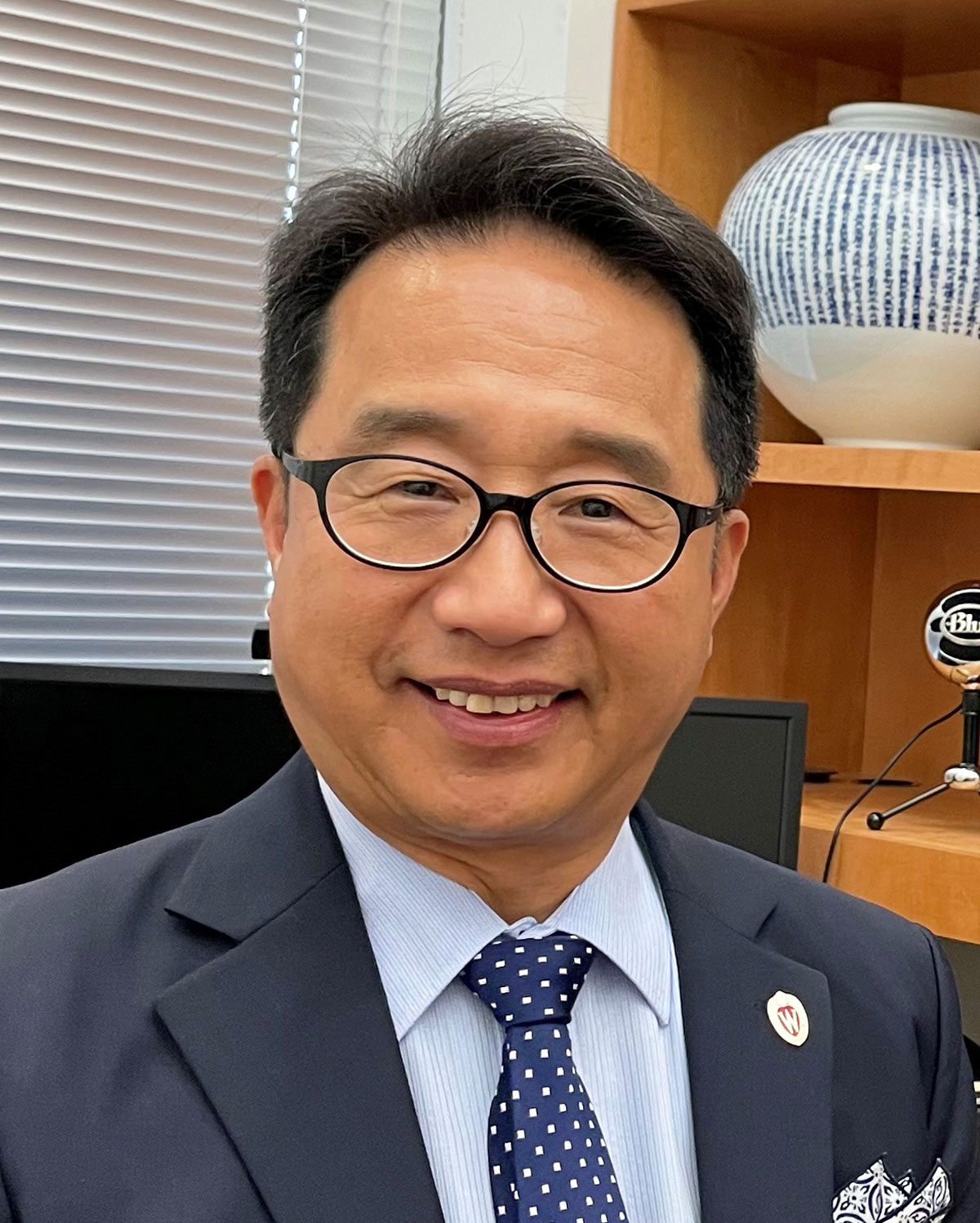 | Professor, Department of Bacteriology, UW-Madison
1550 Linden Drive
(608) 262-4696
3155 Microbial Sciences Building
jyu1@wisc.edu |
https://bact.wisc.edu/people_profile.php?t=rf&p=jyu1
- BS 1986, Seoul National University, Seoul, Korea; Microbiology
- MS 1991, University of Wisconsin–Madison; Food Science
- PhD 1995, University of Wisconsin–Madison; Genetics
- Postdoc 1995–1998, Texas A&M University; Genetics
Fungi and mycotoxins: molecular genetics and genomics of spore formation and mycotoxin biosynthesis in filamentous fungiThe genus
Aspergillus encompasses the most common fungi in our environment. Many
Aspergillus species are beneficial to humans, but they also include serious animal and plant pathogens. Moreover, most (if not all)
Aspergillus species have the ability to produce one or more toxic secondary metabolites called mycotoxins. All Aspergilli produce asexual spores as the main means of dispersion and biosynthesis of certain mycotoxins is intimately related with fungal sporulation. The primary interest of my research program is to understand how fungi coordinate growth, sporulation and toxin biosynthesis employing the model fungus
Aspergillus nidulans. We showed that two antagonistic regulatory pathways govern vegetative growth and sporulation in
A. nidulans. Vegetative growth is primarily mediated by a heterotrimeric G protein, which stimulates fungal growth while inhibiting asexual/sexual sporulation as well as production of the carcinogenic mycotoxin sterigmatocystin. We found that the initiation, progression and completion of sporulation are directed by the balanced activities of multiple positive and negative regulators. We are further investigating the detailed molecular mechanisms regulating these fundamental biological processes via forward/reverse genetics, genomics and biochemical analyses.
- Márton Miskei, Sandugash Ibragimova, Beatrix Kocsis, Tibor Nagy, Hee-Soo Park, Tamás Emri, Jae-Hyuk Yu, Éva Leiter, István Pócsi 2025. Genome-Wide Mapping Reveals an Extensive AtfA Regulatory Influence on Development, Metabolism, and Stress Preparedness in Aspergillus nidulans. Cells PMC12731236
- Milton T Drott, Yen-Wen Wang, E Anne Hatmaker, Nayanna M Mercado-Soto, J Mitch Elmore, Dianiris Luciano-Rosaro, Jae-Hyuk Yu, Antonis Rokas, John G Gibbons, Anna Huttenlocher, Kunlong Yang, Nancy P Keller 2025. Population-Specific Transcriptomic Shifts Underlie Secondary Metabolic Diversification in Aspergillus flavus and the Domestication of Aspergillus oryzae. bioRxiv : the preprint server for biology PMC12621884
- Jinhong Wang, Shuangzhen Zhou, Ying Zhang, Shaoyuan Lin, Jae-Hyuk Yu, Zhiqiang Liu, Xiaoyu Li 2025. The GATA Transcription Factor NsdD Regulates Vegetative Growth, Asexual Sporulation, and Melanin Biosynthesis in Colletotrichum siamense and C. graminicola. Phytopathology
- Dasol Choi, Xingrui Fan, Hee-Soo Park, Jae-Hyuk Yu 2025. Strain-specific activation of aspergillic acid biosynthesis in Aspergillus oryzae NRRL 3483. Scientific reports PMC12589512
- Dasol Choi, Xingrui Fan, Jae-Hyuk Yu 2025. Comprehensive Review of Dietary Probiotics in Reducing Aflatoxin B1 Toxicity. Toxins PMC12567907
- Heungyun Moon, Mi-Kyung Lee, Junha Shin, Sung Chul Park, Julio C Rivera Vazquez, Daniel Amador-Noguez, Nancy P Keller, Hee-Soo Park, Kap-Hoon Han, Jae-Hyuk Yu 2025. Species-specific gene regulatory network rewiring mediated by the GATA-type regulator NsdD in Aspergillus. mBio PMC12345274
- Ye-Eun Son, Kyu-Hyun Kim, He-Jin Cho, Jae-Hyuk Yu, Hee-Soo Park 2025. The hyphae-specific C2H2 transcription factor HscA regulates development, stress response, and mycotoxin production in Aspergillus species. mSphere PMC12306176
- Seong-Hwan Jeong, He-Jin Cho, Jae-Hyuk Yu, Hee-Moon Park, Hee-Soo Park 2025. Role of the LAMMER kinase LkhA in fungal development and aflatoxin production in Aspergillus flavus. Journal of microbiology (Seoul, Korea)
- Ahmad Alshannaq, Morgan Henning, Jonah Dixon, Colleen Riley, Dasol Choi, Jae-Hyuk Yu, Nasia Safdar 2025. Potent Antimicrobial Activity of Aspergillus oryzae Fermentate Against Toxigenic Strains of Clostridioides difficile. Antibiotics (Basel, Switzerland) PMC12023927
- Kimberly L Acevedo, Elizabeth Eaton, Julia Leite, Shu Zhao, Katherine Chacon-Vargas, Colin M McCarthy, Dasol Choi, Samuel O'Donnell, Emile Gluck-Thaler, Jae-Hyuk Yu, John G Gibbons 2025. Population Genomics of Aspergillus sojae is Shaped by the Food Environment. Genome biology and evolution PMC12014904
- View all Publications @ PubMed
